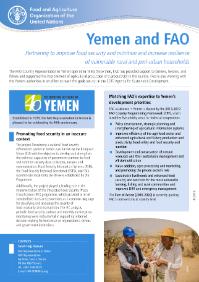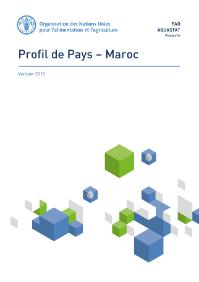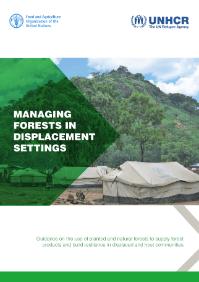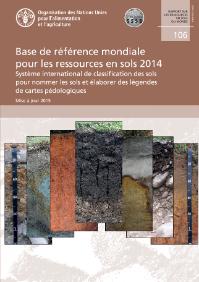Focal point
Location
The Food and Agriculture Organization of the United Nations leads international efforts to defeat hunger. Serving both developed and developing countries, FAO acts as a neutral forum where all nations meet as equals to negotiate agreements and debate policy. FAO is also a source of knowledge and information. We help developing countries and countries in transition modernize and improve agriculture, forestry and fisheries practices and ensure good nutrition for all. Since our founding in 1945, we have focused special attention on developing rural areas, home to 70 percent of the world's poor and hungry people.
Members:
Resources
Displaying 411 - 415 of 5074Yemen and FAO
The FAO Country Representation in Yemen opened in 1990. Since then, FAO has provided support to farmers, herders, and
fishers and supported the improvement of agricultural production and productivity in the country. FAO is also working withthe Yemeni authorities in an effort to reach the goals set out in the 2030 Agenda for Sustainable Development.Profil de Pays – Maroc
Ce profil de pays décrit l’état des ressources en eau et l’utilisation de l’eau, ainsi que l’état de la gestion de l’eau agricole dans le Maroc. L’objectif de cette monographie est de décrire les particularités du pays et les problèmes rencontrés dans le développement des ressources en eau et de l’irrigation en particulier.
Jamaica and FAO
Jamaica joined FAO in 1963. In 1978, the Organization established a representation in Jamaica which today also covers
the Bahamas and Belize. Over the years, FAO has partnered with Jamaica to achieve sustainable agricultural and ruraldevelopment, mainly through the Organization’s Technical Cooperation Programme (TCP). Interventions have ranged frompolicy formulation to technical agricultural development and emergency assistance projects. Recent cooperation has placedManaging forests in displacement settings
The massive increase in demand for woodfuel for cooking caused by sudden influxes of refugees and other displaced people is usually the main driver of forest degradation and deforestation in displacement settings. It places enormous pressure on nearby forests and woodlands and is often a source of tension between the host and displaced communities. A lack of sufficient cooking fuel also has an impact on the nutrition and health of vulnerable people in such settings.
Base de référence mondiale pour les ressources en sols 2014, Mise à jour 2015. Système international de classification des sols pour nommer les sols et élaborer des légendes de cartes pédologiques
La première édition de la Base de référence mondiale pour les ressources en sols (WRB) a été publiée lors du 16ème Congrès Mondial de la Science du Sol à Montpellier en 1998. Lors du même événement, elle fut adoptée comme système de corrélation des sols et de communication internationale de l'Union Internationale des Sciences du Sol (IUSS). La seconde édition de la WRB a été publiée au 18ème Congrès Mondial à Philadelphie en 2006.











